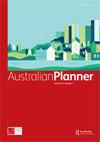Gender bias in the planning industry and planning outcomes
IF 1.5
Q2 Social Sciences
引用次数: 2
Abstract
ABSTRACT Through a dozen in-depth interviews of urban planning professionals in Brisbane, Australia, this study examines the relationship between the experience of women in the planning profession and the consideration of women’s issues in the city. The study reveals that Brisbane’s planning industry continues to be perceived by those who work within it as an ‘old-boys-club’. Planning practitioners are acquiring gender biases during their university education and possibly earlier – much before planning graduates enter the profession. Although the planning industry is adopting more inclusive leadership and management approaches and becoming more feminised, patriarchal relationships remain strong. Brisbane’s neoliberal planning and governance systems, and conservative business sector encourages and rewards ‘male’ behaviours in the workplace. The findings mostly corroborate earlier studies on gender issues in organisations. In the planning sector, gender issues are more concerning because they affect planning outcomes across the city, as well as the lived experiences and needs of women and other vulnerable groups.规划行业中的性别偏见和规划结果
摘要本研究通过对澳大利亚布里斯班城市规划专业人士的十几次深入访谈,考察了女性在规划行业的经历与对城市中女性问题的考虑之间的关系。研究表明,布里斯班的规划行业仍然被其工作人员视为“老男孩俱乐部”。规划从业者在大学教育期间,甚至可能更早——在规划毕业生进入该行业之前,就已经获得了性别偏见。尽管规划行业正在采用更具包容性的领导和管理方法,并变得更加女性化,但父权关系仍然很牢固。布里斯班的新自由主义规划和治理体系以及保守的商业部门鼓励和奖励工作场所的“男性”行为。这些发现大多证实了早期对组织中性别问题的研究。在规划部门,性别问题更令人担忧,因为它们影响整个城市的规划结果,以及妇女和其他弱势群体的生活经历和需求。
本文章由计算机程序翻译,如有差异,请以英文原文为准。
求助全文
约1分钟内获得全文
求助全文

 求助内容:
求助内容: 应助结果提醒方式:
应助结果提醒方式:


